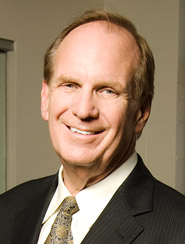
Marty Rueter, president of Weichert Real Estate Affiliates, says his company's emphasis on training sets them apart.
By Stephanie Sims
Weichert, Realtors, the largest independent brokerage in the nation, is known for its training program, Weichert University, which provides a basic – but intense – 60- to 90-day session of training courses required of all new Weichert agents. This training is followed by three months of close mentoring to make sure agents are on track for success. Using the systems developed by Weichert, agents can move directly into the real estate business with leads provided and a proven system of turning leads into success.
“We have had systems in place since the beginning,” says Marty Rueter, president of Weichert Real Estate Affiliates, Inc. “Seventy percent of new agents don’t survive the first year, according to national statistics. We have completely opposite statistics – 70 percent thrive using our system. Most agents just need to learn the systems and implement them.”
Weichert University is divided into different coursework sections, such as listing presentations and open houses. Better yet, tuition is free and courses are available 24/7. But two important lessons the school teaches come in handy no matter what clients throw at them, and resonate with agents throughout their career: communication and planning.
“There is a direct relationship between activity and production, and planning is a big part of that,” Rueter says. “At Weichert, we measure activity long before we look at what an agent actually sold.”
Chicago Agent asked the man behind the brokerage with the plan his advice to help agents avoid failure. Here are what he considers his most important tips:
- Commit to becoming a career professional. Weichert, Realtors puts its agents through “basic training” with a minimum 60-day action plan that reinforces sales training, turning information and techniques into lifelong habits.
- Focus on listing. You’ll make infinitely more per hour securing and servicing your listings, versus acting as an unpaid chauffer. Rueter says Weichert’s top sales agents are listing agents, and by comparing their number of hours spent securing a listing vs. securing buyers, a listing agent makes five times more per hour. “There’s a tendency to avoid becoming listing agents due to a lack of confidence, not knowing what to do and not knowing how to prospect,” Rueter says. “When a buyer says ‘no,’ that’s to a property. When a seller says ‘no,’ they’re saying no to you. That rejection is tough.” Master a listing presentation that de-emphasizes personal experience and accolades. Emphasize your marketing program in terms that readily differentiate you from your competition. Have a compelling answer to that universal real estate question, “Why should I list with you?”
- Get into a routine of daily, active prospecting. Go where others dare not venture by calling people, and more than once. “We teach prospecting ‘I-call’ sessions, following a weekend open house, where we have to script agents and have them call people and ask them if they’re still interested,” Rueter explains. “Rather than calling it cold calling, we call it warm calling.” Practice your telephone skills. Recognize that the initial goal of every customer contact is to physically meet with them, not to overly pre-qualify or simply swap information.
- Know your market and inventory better than the back of your hand. This may require that you target your prospecting to more local, more manageable neighborhoods, property types or price points.
- Make sure any marketing you do conforms to your company look, feel and message. Be efficient with your marketing dollars; spend less on passive advertising, gimmicks or giveaways. Invest instead in programs, products or services that let you talk to more people up front and personal.
- In addition, take advantage of marketing tools your brokerage can provide. Weichert’s Doors Portfolio listing system is based on a two-visit, three-step process of pre-inspection, preparation and presentation, featuring a proprietary property inspection tool (paper or tablet), a “price trend analysis” evaluation tool, and an oversized, “artist style” listing portfolio that showcases a customized marketing plan for the proposed new listing. The listing portfolio features specific examples of the subject property that will be promoted on Weichert’s website, various advertising, mailers and other promotions.
- Categorize your prospects according to their urgency and ability to buy or sell. Ignore no prospect, but focus on those who are ripe to buy or sell. Incubate those who aren’t ready.
- Use technology as a tool, never a substitute for personal contact. Understand that customer follow-up involves more than automatic emailing. Don’t substitute social networking for old time farming, networking or canvassing; use it as part of your strategy to maintain existing customers.
- Specialize in something. Whether it’s a specific neighborhood, price range or particular real estate expertise, such as short sales, condos or investment real estate. Generalists, like family practitioners, have become a dying breed, based on customer need and demand.
- Ongoing education is so important. Weichert University offers more than 190 courses, varying from Microsoft technology to agent skill courses. But nothing teaches like hands-on experience, a fundamental part of Weichert University. “Each agent is assigned to a mentor, and works with that agent for a certain number of transactions,” Rueter says. “One reason most agents don’t stay on track is because there’s no follow-up plan for them afterwards with clients, and there’s no coaching. Those agents aren’t going to make it. It’s too difficult to learn to swim on your own; everyone needs lessons to learn.”
The secret to the Weichert recipe is the integrated client services model. Today’s client demands more and Weichert delivers.